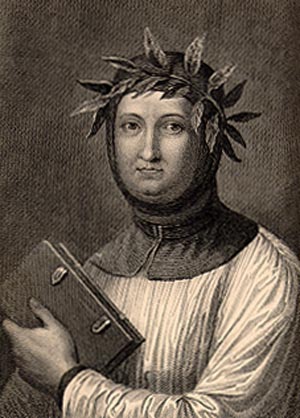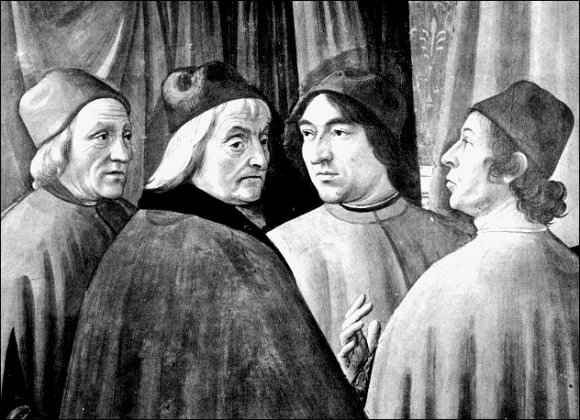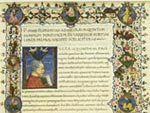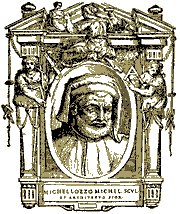
Cosimo Medici and Civic Humanism

Petrarch (1304-1374) is often hailed as the father of the Renaissance, yet Leonardo Bruni (1304-1374) gave the movement substance.
Through his translations of the Greek classics particularly Plato and Aristotle, the ancient
world became more accessible. Cosimo took this one step further by making all the known
literature of Plato and other writers available in Italian. Cosimo was truly a catalyst in the
spreading of humanistic scholarship at the beginning of the Renaissance. With a keen intellect
he discussed philosophy into the night with his friends, who were scholars, clerics, and wealthy
venture capitalists like himself.

In addition to actively purchasing rare books, Cosimo hired and
educated his own research assistant, Marisilio Ficino (1433-99), who learned Greek in order to
translate all of Plato's works into Latin. This project was inspired by the visit of the
General Council of the Church that took place in Florence. The year was 1439 and Cosimo felt
he'd accomplished much to bring such an important delegation to his city. Both he
and Ficino participated in the sessions and became inspired in particular by Gemistos Plethon
who championed Plato. It was not long after that the Platonic Academy was founded with a desire to synthesize Christianity with Platonism.
What followed was an idealization of Platonic love, which inspired the patronage to the Arts even further.
This perception that the sensual was a mirror of the ideal archetypes, "harmonized the very real Renaissance quest for spiritual
elevation with the age's delight in amorous poetry and song and in the beauty of the human body as exhibited in painting and sculpture."(Mapp, 46).
 Florence became the leading city of the Renaissance period (1400-1600) primarily through the influence of the Medici family, whose wealth in commerce was used to promote the Arts and the ideals of Humanism.
As bankers they financed even Rome and came into power at a politically charged time.
"By the 1430s and 1440s, when Cosimo de' Medici was consolidating his political preeminence
Florence became the leading city of the Renaissance period (1400-1600) primarily through the influence of the Medici family, whose wealth in commerce was used to promote the Arts and the ideals of Humanism.
As bankers they financed even Rome and came into power at a politically charged time.
"By the 1430s and 1440s, when Cosimo de' Medici was consolidating his political preeminence
 in Florence, Bruni and his fellow humanists had already fully articulated the belief that an ideal ruler in both a republican and monarchical context should be able to draw upon the deep
and rich well of philosophy to ensure the sound governance of the state."(Jurdjevic)
Cosimo was patron to many of these same philosophers and even had influence in the
Signoria to appoint certain humanists to the chancery as chancellors, including Leonardo Bruni,
Poggio Bracciolini, Carlo Marsuppini, and Bartolomeo Scala. "Cosimo de'Medici,
despite his energetic pursuit of business and politics, was not too absorbed in these
activites to be the patron of Brunelleschi, Michelozzo, and Fra Angelico." (Mapp, 36) By the time of the invention of the printing press and its introduction into Italy around 1465 Cosimo's private library as well as the library at San Marco was quite a storehouse of knowledge ready to be disseminated to the rest of Europe. "The libraries of the Italian Renaissance gathered and preserved every important
item in manuscript that survived the Middle Ages until the invention of the
printing press could make them available to the world."(Wallerstein, 8)
in Florence, Bruni and his fellow humanists had already fully articulated the belief that an ideal ruler in both a republican and monarchical context should be able to draw upon the deep
and rich well of philosophy to ensure the sound governance of the state."(Jurdjevic)
Cosimo was patron to many of these same philosophers and even had influence in the
Signoria to appoint certain humanists to the chancery as chancellors, including Leonardo Bruni,
Poggio Bracciolini, Carlo Marsuppini, and Bartolomeo Scala. "Cosimo de'Medici,
despite his energetic pursuit of business and politics, was not too absorbed in these
activites to be the patron of Brunelleschi, Michelozzo, and Fra Angelico." (Mapp, 36) By the time of the invention of the printing press and its introduction into Italy around 1465 Cosimo's private library as well as the library at San Marco was quite a storehouse of knowledge ready to be disseminated to the rest of Europe. "The libraries of the Italian Renaissance gathered and preserved every important
item in manuscript that survived the Middle Ages until the invention of the
printing press could make them available to the world."(Wallerstein, 8)
Humanism Defined
Back to Home
 Florence became the leading city of the Renaissance period (1400-1600) primarily through the influence of the Medici family, whose wealth in commerce was used to promote the Arts and the ideals of Humanism.
As bankers they financed even Rome and came into power at a politically charged time.
"By the 1430s and 1440s, when Cosimo de' Medici was consolidating his political preeminence
Florence became the leading city of the Renaissance period (1400-1600) primarily through the influence of the Medici family, whose wealth in commerce was used to promote the Arts and the ideals of Humanism.
As bankers they financed even Rome and came into power at a politically charged time.
"By the 1430s and 1440s, when Cosimo de' Medici was consolidating his political preeminence
 in Florence, Bruni and his fellow humanists had already fully articulated the belief that an ideal ruler in both a republican and monarchical context should be able to draw upon the deep
and rich well of philosophy to ensure the sound governance of the state."(Jurdjevic)
Cosimo was patron to many of these same philosophers and even had influence in the
Signoria to appoint certain humanists to the chancery as chancellors, including Leonardo Bruni,
Poggio Bracciolini, Carlo Marsuppini, and Bartolomeo Scala. "Cosimo de'Medici,
despite his energetic pursuit of business and politics, was not too absorbed in these
activites to be the patron of Brunelleschi, Michelozzo, and Fra Angelico." (Mapp, 36) By the time of the invention of the printing press and its introduction into Italy around 1465 Cosimo's private library as well as the library at San Marco was quite a storehouse of knowledge ready to be disseminated to the rest of Europe. "The libraries of the Italian Renaissance gathered and preserved every important
item in manuscript that survived the Middle Ages until the invention of the
printing press could make them available to the world."(Wallerstein, 8)
in Florence, Bruni and his fellow humanists had already fully articulated the belief that an ideal ruler in both a republican and monarchical context should be able to draw upon the deep
and rich well of philosophy to ensure the sound governance of the state."(Jurdjevic)
Cosimo was patron to many of these same philosophers and even had influence in the
Signoria to appoint certain humanists to the chancery as chancellors, including Leonardo Bruni,
Poggio Bracciolini, Carlo Marsuppini, and Bartolomeo Scala. "Cosimo de'Medici,
despite his energetic pursuit of business and politics, was not too absorbed in these
activites to be the patron of Brunelleschi, Michelozzo, and Fra Angelico." (Mapp, 36) By the time of the invention of the printing press and its introduction into Italy around 1465 Cosimo's private library as well as the library at San Marco was quite a storehouse of knowledge ready to be disseminated to the rest of Europe. "The libraries of the Italian Renaissance gathered and preserved every important
item in manuscript that survived the Middle Ages until the invention of the
printing press could make them available to the world."(Wallerstein, 8)

